Tiger Leaping Gorge Posted by sasha on Oct 12, 2015 in Uncategorized
For lovers of the great outdoors and adventure travel, one place that should be high atop your China bucket list is the Tiger Leaping Gorge (虎跳峡 – hǔ tiào xiá) in Yunnan province. This epic 2-day hike takes you up in the mountains, where you’ll truly feel like you’re hiking in the clouds as you gaze down at the mighty Yangtze River (长江 – cháng jiāng) flowing in between towering peaks. I’ve had lots of incredible travel experiences in my 5+ years in China, but this one ranks way up there and even made it into my Top 10 list. Here’s a little preview of what to expect should you choose to hike Tiger Leaping Gorge.
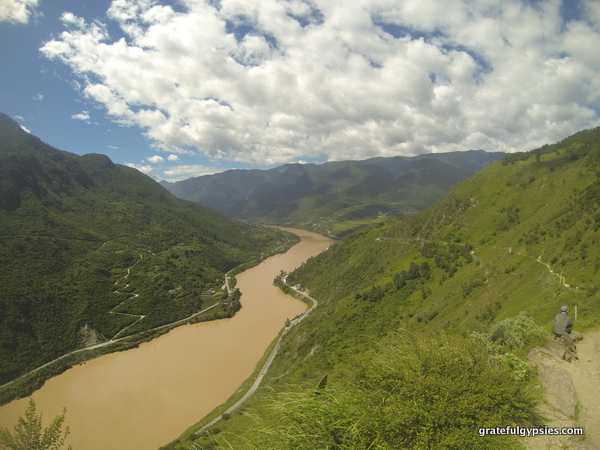
Tiger Leaping Gorge
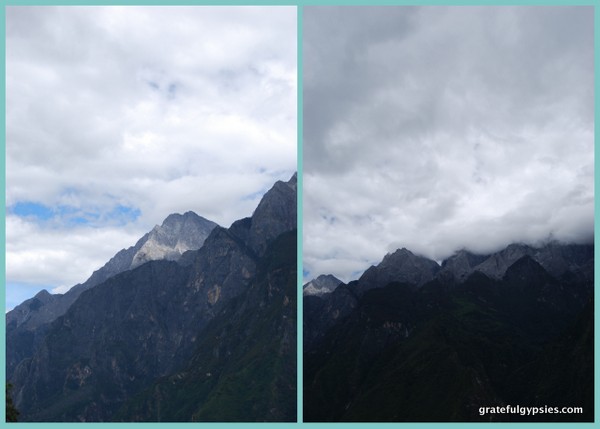
In the clouds.
There are a few options for visiting Tiger Leaping Gorge. The easy way out is taking a bus to Tina’s Guesthouse, where you simply walk down to get a closeup view of the river and the point where a tiger supposedly leaped over it (hence the name). Granted it’s no easy walk down, but this is a cakewalk compared to the longer hike that takes you up first.
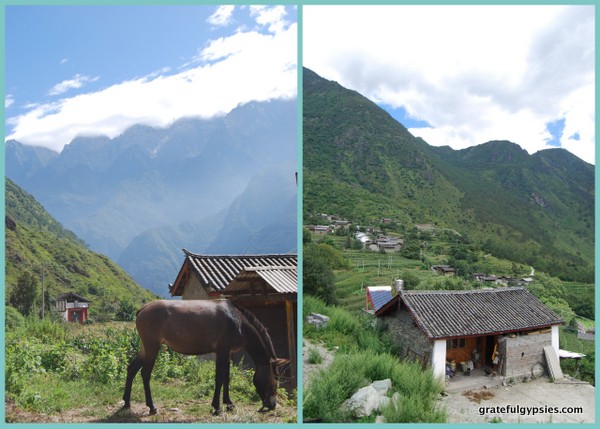
Take the high road…
Should you want to take the long way, you’ll get dropped off at a supposed trail head with zero direction about where to go. Perhaps it was due to the construction that was going on when we visited, but it wasn’t clear at all which way we were meant to walk. Making what we hoped was an educated guess, we ended up on someone’s small mountain farm, much to the dismay of their herd of tiny dogs. The pooches seemed harmless enough, so we continued on our way. Next thing we knew, and one of the mangy mutts had bitten my wife on the leg – not something you want to have happen out in the middle of nowhere rural China. Rabies is definitely a concern out here, but the dog wasn’t foaming at the mouth or anything so we decided to power on. Thanks to some fellow hikers, she got the wound cleaned and bandaged up and we continued on our way.
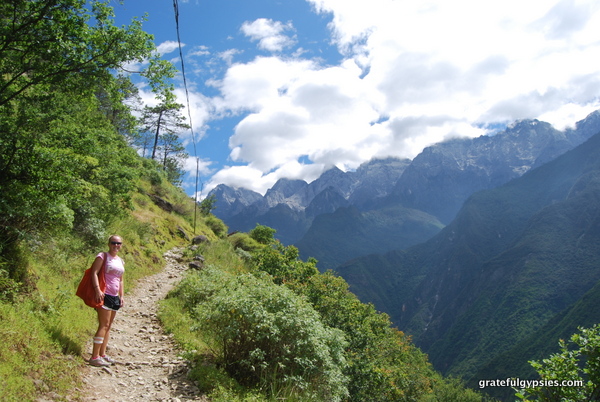
Bandaged up and ready to keep going.
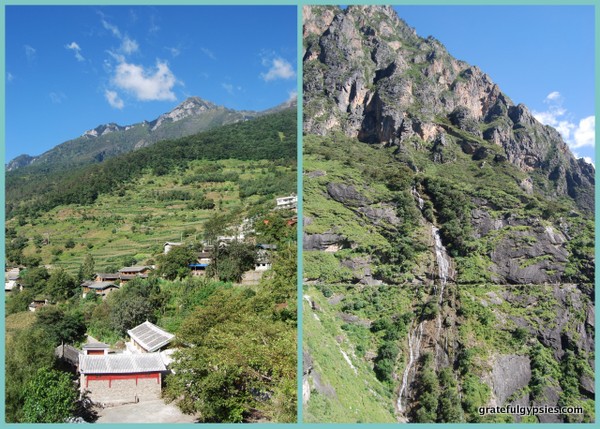
A beautiful place to hike.
As you rise higher and higher, the views become more and more spectacular. It was a tough choice, but persevering and continuing with the hike proved to be a great decision. Plus, we got her a rabies shot as soon as we got to the next town. The fact that we were able to procure an “herbal remedy” along the trail certainly helped as well. Nowhere else in China will you find grannies selling weed alongside fruit and bottled water. Welcome to Yunnan!
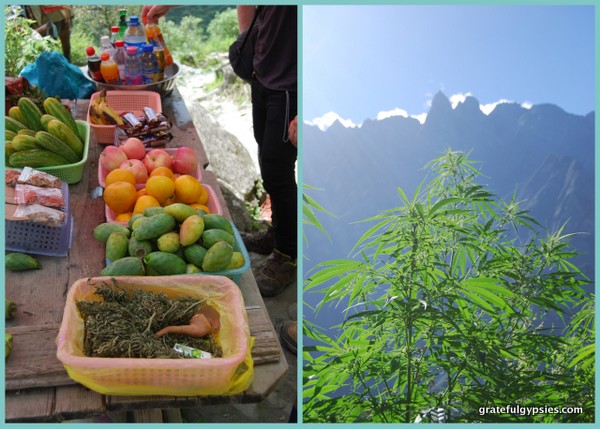
Herbal remedies.
After a few hours of hiking, you come to the Naxi Guesthouse. Some choose to call it a day and overnight here, while most simply stop for lunch, coffee, and a short breather. After a big lunch and some strong Yunnan coffee, we were ready to tackle the next portion of the hike. Once you get up there, the trail is relatively flat and easy. That is, until you arrive at the 28 bends. Ever the opportunists, there are villagers ready to sell you water, snacks, and even a ride on their horse for those who just can’t make it up this difficult part of the trial.
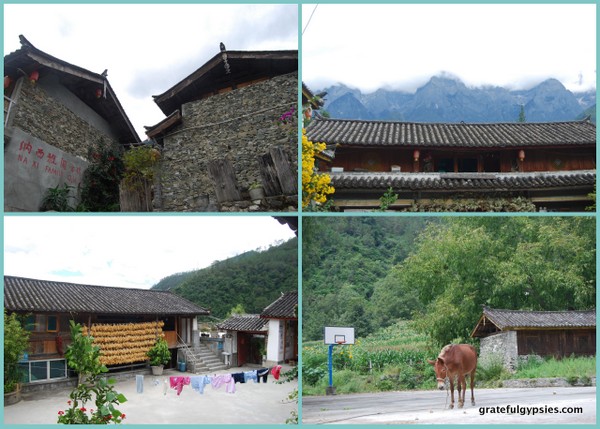
Break time at Naxi Guesthouse.
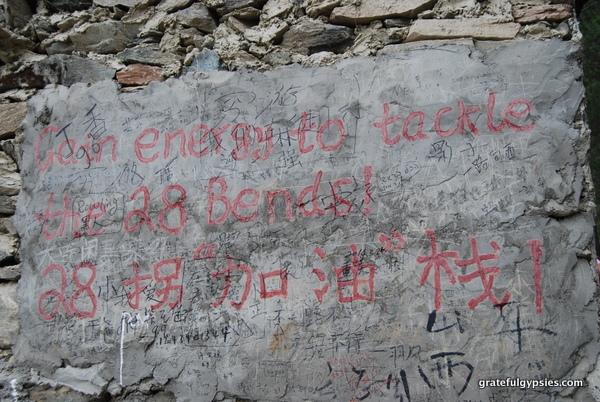
Add oil for the 28 bends!
Around the half-way point of the hike, there are a few guesthouses to choose from. Having heard good things from fellow travelers, we went with the appropriately named Halfway House. They have a variety of rooms, such as doubles, triples, or dorms, a restaurant, a rooftop with breathtaking views, and the self-proclaimed “most scenic toilet in the world.” While the toilet itself was your usual hole-in-the-ground that’s common in rural China, the view out the window sure is something special.
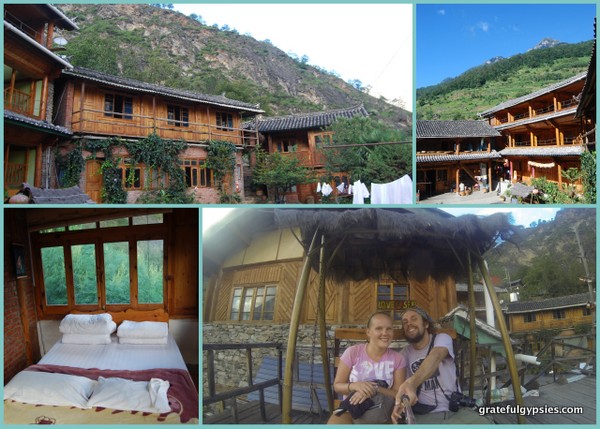
Halfway House
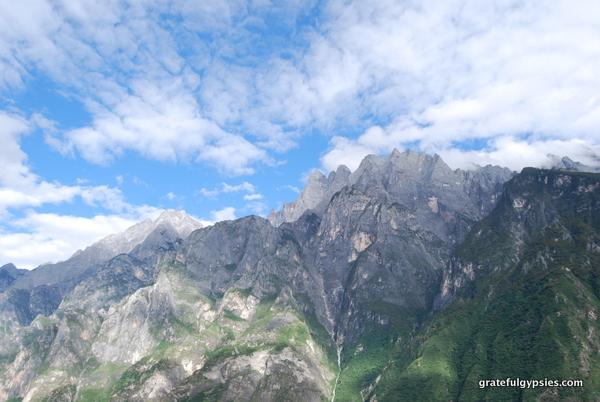
Toilet with a view!
On day two, we got up feeling refreshed and ready to hit the trail again. Highlights of the day’s hike included watching mountain goats do battle and walking by a couple of rushing waterfalls.
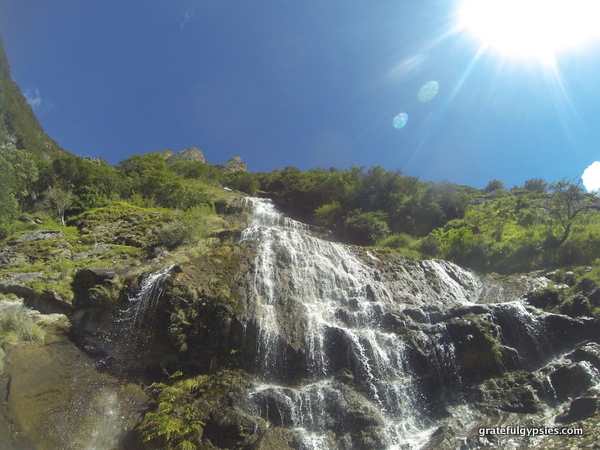
Ragin’ waterfall.
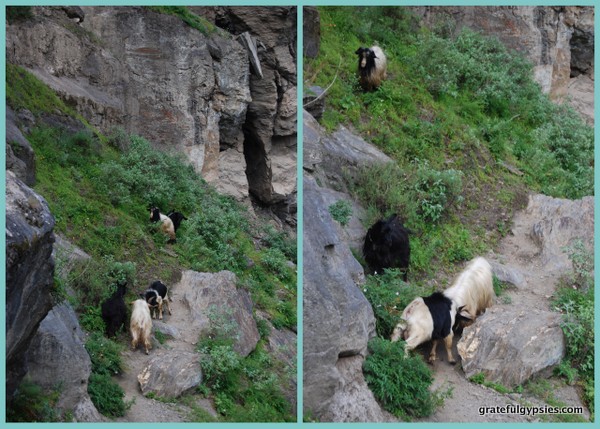
Fighting goats on the mountainside.
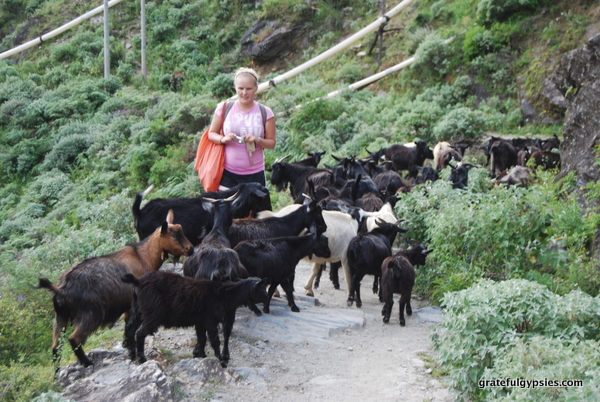
Don’t be scared!
After a few hours of walking downhill, we arrived at Tina’s Guesthouse. It should be noted that those coming from Lijiang or Shangri-la with excess luggage will almost always have their bags delivered here, so you don’t need to worry about hauling all your stuff with you on the hike. Tina’s also has rooms, a restaurant, and onward transportation tickets. She’s a very bossy lady, so don’t be surprised if she tries to push you into using one or all of her services. We grabbed some waters and Snickers bars and continued on our way down to the river.
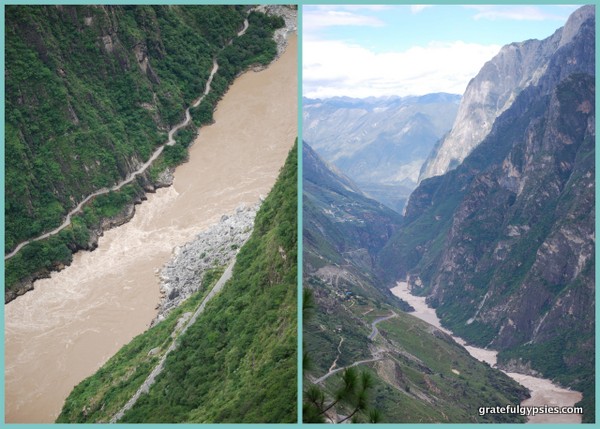
Making our way down.
As is quite common throughout China, there are all sorts of hidden fees associated with Tiger Leaping Gorge. First of all, you pay for a ticket to enter the scenic area (65 RMB/person). Should you want to hike down to the river, locals have also set up checkpoints to collect a small fee for the trails and bridges that they put together. Rather than fight and argue about it, just fork over the 15 RMB and enjoy a nice hearty laugh at their abysmal Chinglish sign.
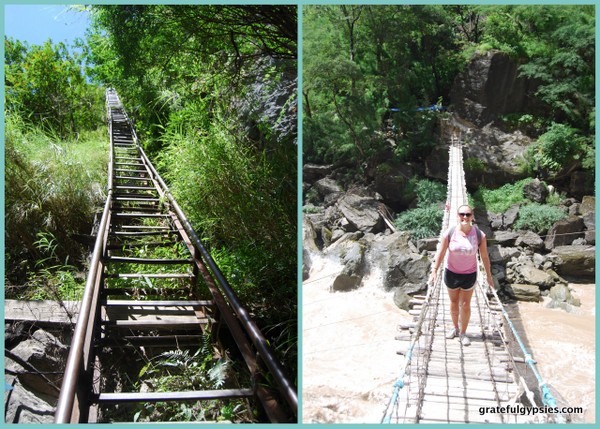
We didn’t try the first one…
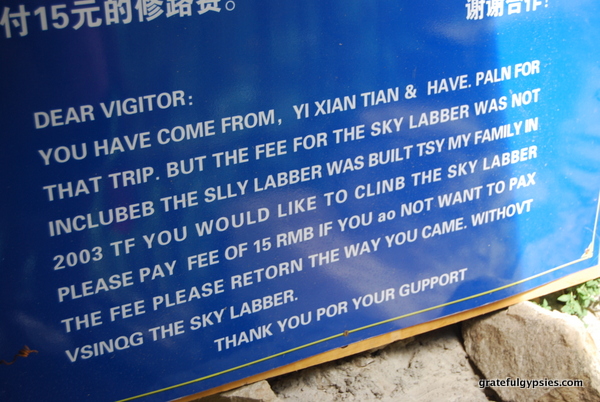
Close, but no cigar…
Rather than hike straight back up to Tina’s, we decided to take the longer and more scenic way. After another two hours or so and a bit of aimless wandering, we finally got back to the main road. There’s a Tibetan style guesthouse there, which we would have stayed in had we actually had our stuff with us. Instead, we settled for an awesome lunch there and some cold beers to celebrate completing the famed hike.
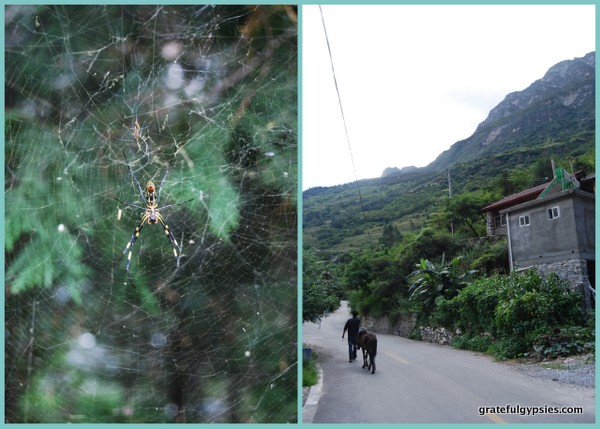
Taking the scenic way.
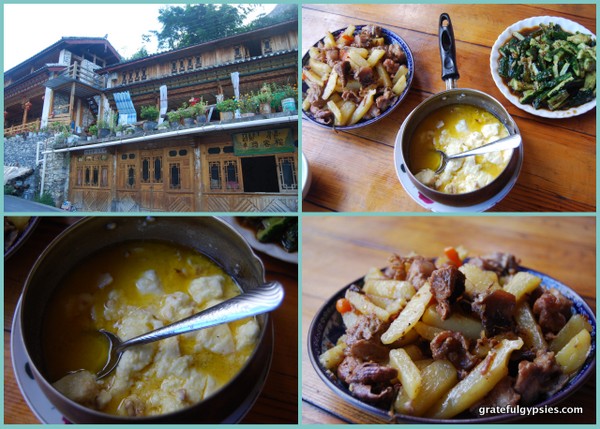
An awesome Tibetan lunch.
Arriving back at Tina’s a bit late in the evening, we basically had no choice but to stay the night in the area before catching a bus out the next morning. As her place gets plenty of business from the hordes of tourists who arrive there every day, we sought out a local guesthouse up the road that had cheaper rooms and a far better view of the river.
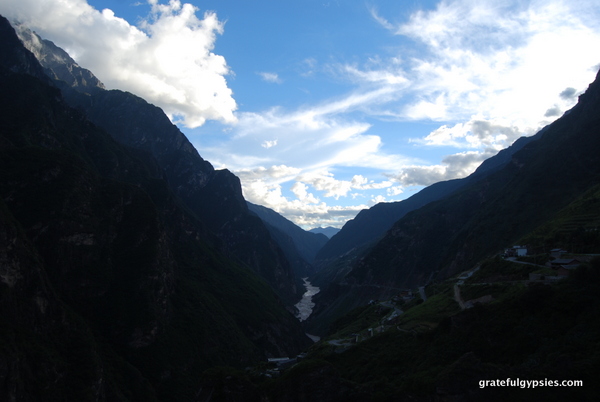
View from our room.
Despite the rabies scare, hiking Tiger Leaping Gorge was a wonderful experience and one that we would highly recommend to anyone traveling in China, especially those who make it all the way to Yunnan. Getting there is simple from both Lijiang and Shangri-la, and you can continue on with your trip rather than backtracking. For example, we did Lijiang > Tiger Leaping Gorge > Shangri-la with an extra night in a small mountain village called Haba. Although the purpose of staying there was to see the Baishuitai (白水台 – bái shuǐ tái) terraces, that ended up being an epic fail due to a lack of viable transportation options. It was nice enough relaxing in Haba and the family who ran the guesthouse cooked up a fantastic meal for us, but you’re probably better off just continuing on to your next destination rather than stopping here. That is unless you’ve still got the energy to climb another mountain, as you can scale Haba Snow Mountain from here.

We did it!
For more travel articles and a full guide to living and working in China, check out our website over at Grateful Gypsies.

Build vocabulary, practice pronunciation, and more with Transparent Language Online. Available anytime, anywhere, on any device.
About the Author: sasha
Sasha is an English teacher, writer, photographer, and videographer from the great state of Michigan. Upon graduating from Michigan State University, he moved to China and spent 5+ years living, working, studying, and traveling there. He also studied Indonesian Language & Culture in Bali for a year. He and his wife run the travel blog Grateful Gypsies, and they're currently trying the digital nomad lifestyle across Latin America.




Leave a comment: